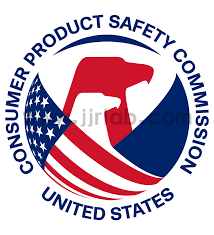
How Much Does CPSC Compliance Testing Cost?
The toy industry, as one of the "best-selling products" in the export sector, has always played a significant role. However, children are a vULnerable and sensitive group, lacking the ability to recognize safety risks. Defective toys could potentially pose fatal dangers. Therefore, various countries strictly regulate this popular category, and exported products must pass CPSC Certification.
cpsc certification costs quoted by China's JJR Laboratory range from $500 to $1,200 USD. You can provide a product manual to get the latest quote from us. Our testing fees are 30% lower than other institutions.

What is CPSC Certification?
CPSC certification is a system primarily targeting children's products and daily-use items to ensure consumer rights and personal safety. It applies to all children’s products and general goods sold in the U.S. market, including but not limited to toys, furniture, appliances, clothing, and stationery. Any consumer product that may cause safety issues or harm to the human body requires CPSC certification.
Scope and Requirements of CPSC Certification
CPSC certification covers a wide range of products, focusing on consumer goods with safety risks. The common product categories include:
1. Toys: Includes children's toys, games, models, etc.
2. Children's Products: Such as cribs, high chairs, strollers, and child seats.
3. Baby Products: Including bottles, pacifiers, diapers, etc.
4. Electronics: Covers household appliances, children's electronic toys, and devices.
CPSC Certification Testing Items
1. astm f963-17 Standard (for children's toys):
- Mechanical and Physical Performance Tests: Durability, structural strength, tensile testing, etc.
- Chemical Composition Tests: Heavy metal content, toxic substances, etc.
- Flammability Tests: Flame resistance and combustibility.
- Swallowing and Choking Hazard Tests: Small parts and magnetic components testing.
Obtaining CPSC Certification
CPSC certification requires companies to provide comprehensive product technical documentation and undergo safety testing to ensure compliance with CPSC safety standards. Common requirements include:
1. Technical Documentation: Companies must provide detailed product design and manufacturing information, including material composition, structural drawings, and production processes. These documents help CPSC evaluate product safety performance.
2. Safety Testing: A series of safety tests assess compliance with CPSC safety standards, including toxicological performance, flammability, and mechanical performance testing. These tests must be conducted by a CPSC-recognized testing body, such as China's JJR Laboratory, which issues the corresponding reports.
3. Labeling and Documentation Requirements: After obtaining CPSC certification, products must bear the CPSC certification mark to indicate compliance. Additionally, technical files and safety instructions must include copies of the certification for inspection purposes.
4. Product Modifications and Recertification: Any changes that affect product safety performance, such as design, material composition, or manufacturing processes, require recertification.
5. Safety Performance Control and Management: Companies need stringent control over product safety, including material selection, supply chain management, and internal quality control systems to ensure compliance with CPSC safety standards.
6. Compliance with Regulations and Standards: Companies must adhere to applicable regulations, CPSC safety standards, and technical guidelines.
Documents RequiRED for CPSC Certification
1. Application Form.
2. Product Information (including images, drawings, and size specifications).
3. Testing Samples.
Costs and Duration of CPSC Certification
- Costs vary depending on the complexity of the product. The more material types involved, the higher the total testing cost.
- Typical processing time for CPSC certification is 5–7 business days for standard products (expedited services available), with variations based on product complexity.
What is a CPC Certificate?
CPC stands for Children's Product Certificate. This certificate originates from the U.S. cpsia requirements, mandating that manufacturers of children's products (domestic/imported) prove their products comply with applicable safety regulations through testing by a CPSC-recognized third-party laboratory.
The CPC certificate includes the results of the ASTM and CPSIA reports, which must pass testing to issue the compliance statement.
Content Covered by the CPC Certificate
1. A detailed description of the product covered by the certificate, ensuring its distinctiveness.
2. Applicable CPSC safety regulations the product complies with.
3. Name, address, and contact information of the U.S. importer or domestic manufacturer proving compliance.
4. Contact details of the person responsible for maintaining the test reports.
5. Date and location of product manufacturing.
6. Date and location of compliance testing.
7. Information on the CPSC-recognized third-party testing laboratory.
Failure to meet these requirements may result in customs seizing and detaining non-compliant products during inspections.
Additionally, CPC Certification is mandatory for children's products on Amazon’s U.S. platform. Products cannot be listed for sale without CPC certification.
Email:hello@jjrlab.com
Write your message here and send it to us
 How Do You Get a CE Mark
How Do You Get a CE Mark
 IEC 60529 IP Rating Ingress Protection Standard
IEC 60529 IP Rating Ingress Protection Standard
 IEC 60601-1 Medical Electrical Equipment Basic Saf
IEC 60601-1 Medical Electrical Equipment Basic Saf
 European Authorized Representative Medical Devices
European Authorized Representative Medical Devices
 EU Waste Electrical and Electronic Equipment Direc
EU Waste Electrical and Electronic Equipment Direc
 How to Get CE Approval
How to Get CE Approval
 Accelerated Ageing Test
Accelerated Ageing Test
 IP Ingress Protection Testing
IP Ingress Protection Testing
Leave us a message
24-hour online customer service at any time to respond, so that you worry!




